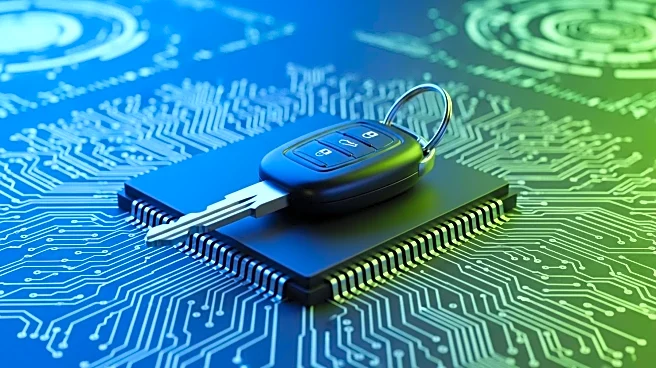What is the story about?
What's Happening?
Jaguar Land Rover (JLR), a subsidiary of Tata Motors, experienced a significant cybersecurity breach in September 2025, disrupting global operations. The attack, attributed to the ransomware group Hellcat, involved the theft of 350 GB of sensitive data, including corporate documents and employee records. This incident follows a similar breach earlier in the year, highlighting recurring vulnerabilities in the automotive sector's digital infrastructure. The breach has had substantial financial implications for Tata Motors, with JLR's earnings before interest and taxes (EBIT) projected to decline by 5% to 7% due to compounded effects of U.S. tariffs and the cyber incident.
Why It's Important?
The breach at JLR underscores the systemic risks faced by the automotive industry, which is increasingly reliant on complex digital ecosystems. The financial impact on Tata Motors is significant, with a reported 49% drop in pre-tax profit for Q3 2025. This incident highlights the urgent need for enhanced cybersecurity measures within the sector, as ransomware attacks have disrupted over 100 automotive firms in 2024 alone. The growing threat landscape has prompted increased cybersecurity spending, with the market projected to grow significantly over the next decade, driven by AI-driven threat detection and regulatory mandates.
What's Next?
In response to the breach, the automotive sector is ramping up cybersecurity investments and adapting to new regulatory frameworks. The global automotive cybersecurity market is expected to expand, with companies adopting proactive security strategies to comply with regulations like UN Regulation 155 and 156. Investor sentiment remains mixed, with Tata Motors' stock experiencing fluctuations following the incident. Analysts remain cautiously optimistic, citing JLR's strong electric vehicle sales growth as a potential offset to the financial impact of the breach.
Beyond the Headlines
The JLR incident serves as a cautionary tale for the automotive industry, emphasizing the importance of prioritizing cybersecurity in both technology and governance. As the sector transitions to software-defined vehicles, the cost of inaction in addressing cybersecurity vulnerabilities will continue to rise. Companies that fail to implement robust security measures risk not only financial losses but also regulatory penalties and eroded consumer trust.















